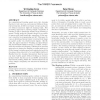Free Online Productivity Tools
i2Speak
i2Symbol
i2OCR
iTex2Img
iWeb2Print
iWeb2Shot
i2Type
iPdf2Split
iPdf2Merge
i2Bopomofo
i2Arabic
i2Style
i2Image
i2PDF
iLatex2Rtf
Sci2ools
124
click to vote
KCAP
2009
ACM
2009
ACM
Interactively shaping agents via human reinforcement: the TAMER framework
As computational learning agents move into domains that incur real costs (e.g., autonomous driving or financial investment), it will be necessary to learn good policies without numerous high-cost learning trials. One promising approach to reducing sample complexity of learning a task is knowledge transfer from humans to agents. Ideally, methods of transfer should be accessible to anyone with task knowledge, regardless of that person’s expertise in programming and AI. This paper focuses on allowing a human trainer to interactively shape an agent’s policy via reinforcement signals. Specifically, the paper introduces “Training an Agent Manually via Evaluative Reinforcement,” or tamer, a framework that enables such shaping. Differing from previous approaches to interactive shaping, a tamer agent models the human’s reinforcement and exploits its model by choosing actions expected to be most highly reinforced. Results from two domains demonstrate that lay users can train tamer ...
Computational Learning Agents | Information Retrieval | KCAP 2009 | Sample Complexity | Tamer Agents |
| Added | 28 May 2010 |
| Updated | 28 May 2010 |
| Type | Conference |
| Year | 2009 |
| Where | KCAP |
| Authors | W. Bradley Knox, Peter Stone |
Comments (0)

